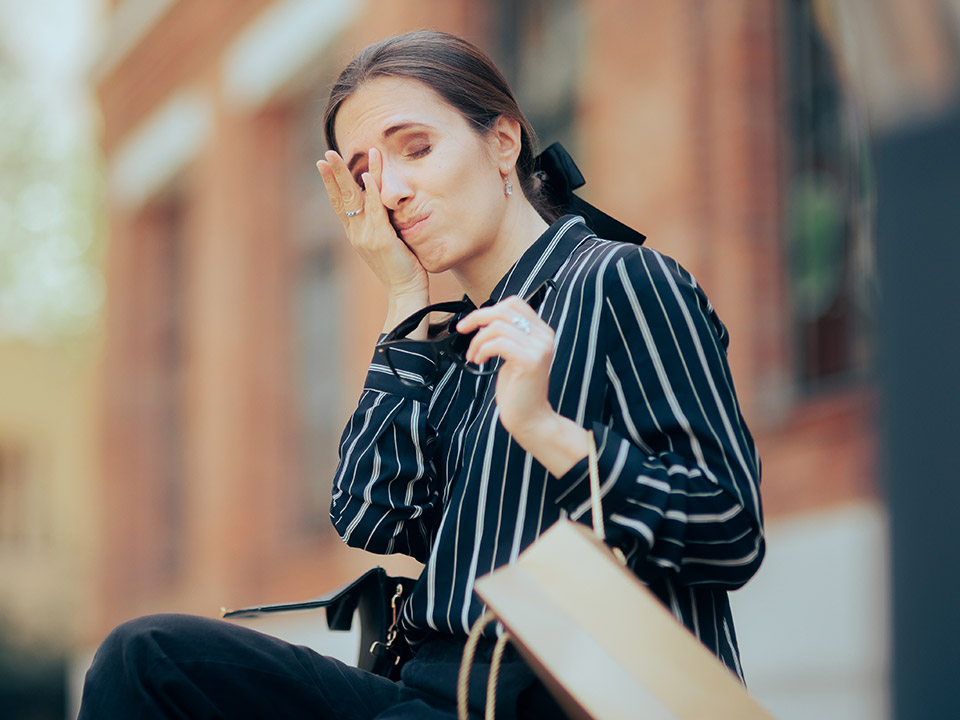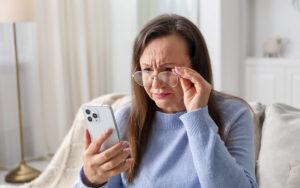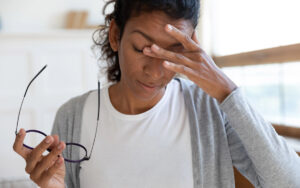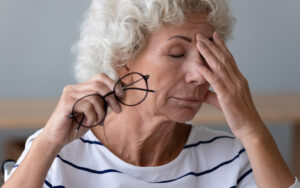Light Sensitivity

Light sensitivity or photophobia means “fear of light.” Despite its misleading title, if you have light sensitivity, you are not afraid of light; you are just incredibly sensitive to it. Bright indoor light or the sunlight can sometimes be very uncomfortable or even outright painful.
Light sensitivity is not a condition; rather, it is often a sign or symptom of another separate medical condition. Swelling inside the eyes, dry eyes, and migraine headaches are commonly associated with photophobia.
Indoor light or bright sunlight can cause you pain. You will often close your eyes or blink when this happens. Some people also get headaches with prolonged or frequent exposure.
What Causes Light Sensitivity?
Light sensitivity occurs in the connection between the nerves that go to the brain and the eye cells that detect light.
One of the most common causes of photophobia is migraines. Almost 80% of people who suffer migraines will have headaches that develop with photophobia. Most people usually have photophobia even when they are not experiencing any headaches.
However, many other kinds of headaches can cause light sensitivity too. People who get cluster and tension headaches also get uncomfortable around the sun or bright light.
Some of the brain conditions that can cause light sensitivity include;
- Meningitis- This bacterial infection inflames the membranes surrounding your spinal cord and brain. This bacterial formation can cause severe medical conditions like seizures, hearing loss, brain damage, and even death.
- Encephalitis- This condition happens when a viral infection inflames your brain. Severe cases of Encephalitis can lead to death as well.
- Subarachnoid hemorrhage- This condition happens when one develops bleeding between the surrounding tissue layers and the brain. It can result in a stroke, brain damage, or even death.
Some of the eye conditions that can lead to photophobia include;
- Dry Eye- This eye condition happens when the tear glands in your eyes produce poor-quality tears or just cannot make enough. It leads to the eyes being excessively dry. Some causes of dry eye include environmental factors, age, medications, and certain medical complications.
- Corneal Abrasion- Corneal abrasions happen when the outermost layer of your eye, the cornea, sustains an injury. This eye injury is usually common and can occur if you get metal particles, dirt, sand, or other foreign objects in the eyes. If your cornea gets infected, you may develop corneal ulcer.
- Scleritis- This condition develops when there is an inflammation in the white part of the eye. Almost half of all the recorded cases are because of diseases that target the body’s immune system, like lupus. Other symptoms include blurred vision, watery eyes, and eye pain.
- Conjunctivitis- Also commonly referred to as “pink eye,” this condition happens when tissues covering the eye’s white parts get inflamed or infected. Viral infections often cause it, but allergies and bacteria can also cause it. Other common symptoms include eye pain, redness, and itching.
Diagnosis
If you think you have light sensitivity, you should talk to an eye doctor and seek medical advice. They will ask you whether you have any other medical conditions and about your symptoms. Afterward, the eye doctor will check your eye health.
Some of the tests the doctor may perform on you include:
- A Slit-lamp Eye Exam- where the doctor will use a special light-based microscope to examine the eye.
- Magnetic resonance imaging (MRI)- where they will use radio waves and powerful magnets to create detailed images of the eyes.
- A Tear Film exam- where they test how much tears your eyes can make to help determine whether you may be suffering from dry eyes.
After the examinations, the physician may recommend a visit to a general doctor for brain assessment. Symptoms can be related to brain issues so if the doctor recommends it, book your consultation soon after.
How to Treat Light Sensitivity
If you want to ease symptoms of light sensitivity, then the best way to do this is to avoid your triggers. Similarly, you can treat the condition to ease symptoms. With that said, here’s what you should do.
Home Care:
Keeping your lights dim while inside and staying away from sunlight can help make light sensitivity symptoms less uncomfortable. Covering your eyes with tinted, dark glasses or keeping them closed can help offer some relief as well. You should also get thicker curtains to block out more light.
Medical Treatment:
Consult a physician or eye doctor immediately if you are experiencing serious symptoms of photophobia. Your eye doctor or physician will conduct a physical exam and eye examination to determine what is wrong.
The doctor may also ask you a few questions concerning the severity and frequency of the symptoms to help them determine what is causing it.
The underlying cause largely determines the treatment you will need. Some of the treatments your doctor may suggest include:
- Rest and medications for migraines
- Eye drops to help reduce inflammation (scleritis)
- Antibiotics (conjunctivitis)
- Artificial tears (dry eye)
- Antibiotic eye drops (corneal abrasion)
Prevention
While one might not have the ability to prevent photophobia, there are certain behaviors you can adopt to help avoid a few of the conditions that are known to lead to light sensitivity, including;
- Avoiding all the triggers that result in migraine attacks.
- Preventing conjunctivitis by not touching your eyes all the time, not sharing makeup, and having good hygiene.
- Washing your hands frequently to help prevent encephalitis.
- Get bacterial meningitis immunization, wash your hands frequently and avoid contact with people that have meningitis.
- Getting encephalitis vaccinations.
Conclusion
Yes, you can resolve light sensitivity. However, you will need to consult an eye doctor to help with a proper and accurate diagnosis to determine what is causing your light sensitivity.
Treating the underlying cause will often do wonders when it comes to lessening the effects of your symptoms.
Light sensitivity is troublesome, annoying, and frustrating, but you can manage it with lifestyle adjustments, like dimming the lights inside and wearing sunglasses outside. With that said, it is advisable to seek medical attention so you can rule out any signs of more serious medical problems.




